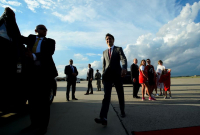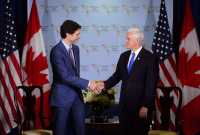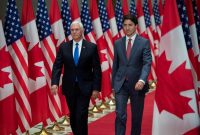Support strong Canadian climate journalism for 2025
Prime Minister Justin Trudeau will lean on the power and influence of the mercurial Donald Trump to raise the issue of two detained Canadians during a bilateral meeting with the Chinese president at a G20 summit in Japan this week — something the U.S. president publicly committed to doing at "Justin's request."
The summit comes at a critical moment for Trudeau, just months ahead of the October election and as Canada continues to push for the release of the Canadians in China — Michael Kovrig and Michael Spavor.
Canada is in multiple trade-related disputes with China as well. Tuesday, China suspended imports of Canadian meat on the grounds that its authorities don't trust Canadian assurances about the quality of its exports. That broadened restrictions on Canadian pork. China has also all but banned Canadian canola seeds on the grounds that previous shipments have contained pests. Exporters of peas and soybeans have also had problems.
Canadian ministers and officials have had little luck getting to speak to their opposite numbers in China.
Earlier this month in Normandy, France, Trudeau said he was looking forward to attending the G20 and that the "opportunity to engage with the Chinese president directly is certainly something that we are looking at."
So far, however, no such meeting has been confirmed by the Prime Minister's Office. Trudeau's staff will only say they expect to have information soon on which leaders Trudeau will meet in Osaka, where key themes include the global economy, trade and investment and innovation.
Trump pledged his support during a meeting with Trudeau last Thursday in the Oval Office, where the two leaders sat together in bright yellow armchairs and the president vowed to bring up the issue in a sit-down with Chinese President Xi Jinping.
"Are you trying to get a meeting?" Trump asked of Trudeau in response to a reporter's question, to which the prime minister replied: "We've got a lot of things to discuss. "
"Anything I can do to help Canada, I will be doing," Trump said.
Trudeau needs that assistance.
The detentions of Kovrig and Spavor are largely viewed as retaliation for the December arrest of Huawei executive Meng Wanzhou in Vancouver, where she awaits extradition to the U.S. to face allegations of fraud in violating Iran sanctions.
David Mulroney, a former Canadian ambassador to China, said it should not come as a surprise that China is not interested in a meeting between its president and the prime minister.
Trump will be Canada's best shot to address the issue of the detentions, said Mulroney.
"That would be the strongest card that could be played in our interests," he said.
"It would be an American card played to say ... 'If you want a normal relationship with us, you'll leave our allies alone.'"
Mulroney said he would also use the G20 to talk to other leaders who face similar challenges with China and are susceptible to its bullying.
"If we can build this sense of shared purpose in pushing back against China, in not allowing ourselves to be isolated like this, that's a big step forward," he said.
"It is in America's interest and it is in the interest of a lot of other countries to see China pull back from hostage diplomacy and bullying... The only way to counter that is through collective action and that is a long, hard slog."
Christopher Sands, the director of the Center for Canadian Studies at John Hopkins University, said Canada doesn't play offence very much but he agreed it would be advisable for Canada to talk to other leaders about the detained Canadians.
Beyond asking for Trump's support, countries like Japan, South Korea and perhaps India might be willing to do the same, Sands said, adding that would only strengthen the U.S. president's commitment to the cause.
To date, a list of countries including Australia, France, German, Spain, the U.S. and the U.K. have spoken in support of the detained Canadians.
Rohinton Medhora, the president of the Centre for International Governance Innovation, said he will be watching to see who else Xi meets in one-on-one sessions — called "bilaterals," or just "bilats," in diplomatic circles.
"Beyond the Trump bilat, how many other bilats does he grant?" Medhora said. "If it turns out that he has very few others, then I wouldn't read that much into it. On the other hand, if he has half a dozen and Canada isn't one of them, then I would read something into that."
The G20 is an opportunity to show whether Canada is a player or not and its place in the world, Medhora added.
"I would say the pressure (is on), especially going into an election when you have to demonstrate that Canada is better and different than four years ago," he said.
Conservative foreign-affairs critic Erin O'Toole echoed that point, saying it is critical Canada not let the opportunity afforded by the G20 pass, especially given the upcoming election campaign.
"As of September, the writ will drop," he said. "This is really the last major time to really shake up and try to stop the spiral of the China relationship."





Comments